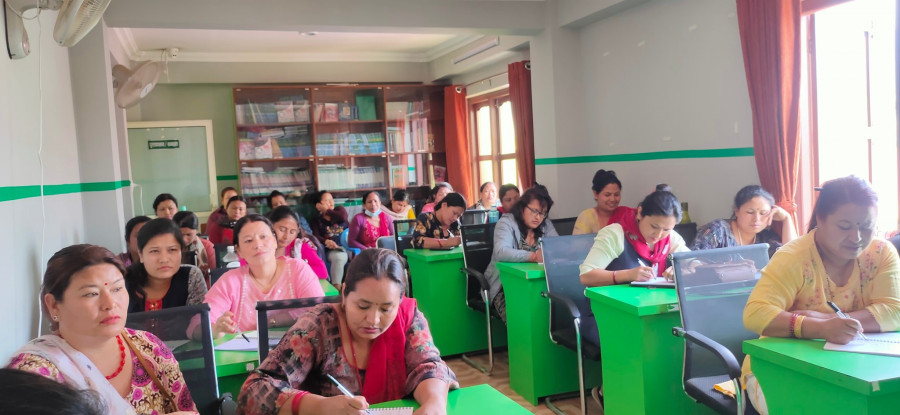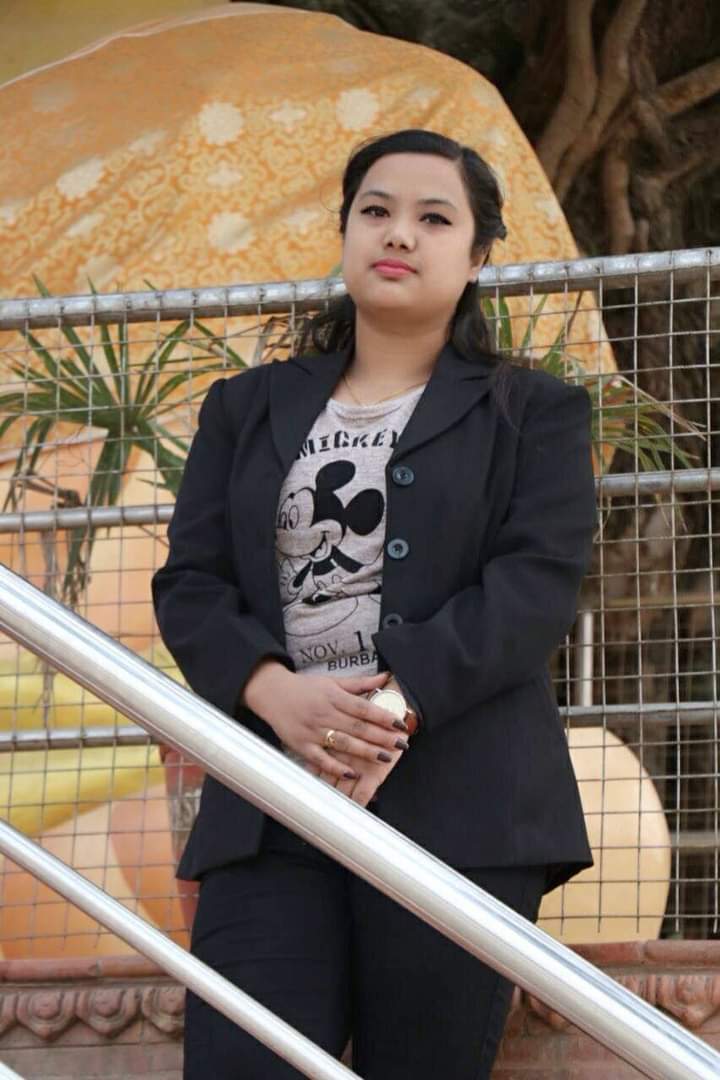Valley
Women in Balambu band together for a common cause
Misa Pucha, a 250-member women's group, was established to arm women with the skills to become financially independent, socially adept and confident in their everyday life.
Rajani Shrestha
Rama Maharjan has been running a tailor shop at her house in Balambu in Chandragiri Municipality, for the past seven years.
Until a few years ago, 38-year-old Rama, a mother of two, would spend her days doing household chores and taking care of the family.
Lethargy had set in, she says, with her mundane daily routine and she longed to utilise her time more productively.
“I always dreamed of using the free time in my hand to become economically independent and support my husband with household finances,” she said. “But I didn’t want financial independence only for myself. I wanted women in my community to also find a way to do so.”
With that thought, Rama established Misa Pucha (Women’s Group)—a not-for-profit that imparts vocational training such as tailoring, sanitary pad making, scooter riding, communications and public speaking, and overall skill development to Newa women in her community.
Rama, who has passed grade 9, wanted to equip the women in her community, including herself, with marketable skills to be able to provide for themselves and their families.
In the past seven years, Rama has established a successful business for herself and passed on her skills to various women in the locality.
“Now I feel empowered because I am helping other women come out of their comfort zones and employ themselves productively,” she told the Post.
Misa Pucha was established on September 1, 2021, with the aim to arm women with the skills to become financially independent, socially adept and confident in their everyday life.
Several women who have benefitted from the training at Misa Pucha talk about how joining the women’s group changed their course of life in small ways and big.
At the time of its establishment, 50 women joined the group with Rama at the helm. Most of the women who joined the group were financially stretched and emotionally withdrawn.
“It is hard for women to run a household with just one source of income,” said Rama. “When I spoke to the women, I found that we were mutually compatible in our financial struggles and social awkwardness. With time, more women came into the fold and made Misa Pucha a successful venture.”
Today Misa Pucha is 250-member strong.
Fifty-two-year-old Puna Maya Maharjan is one of the members of Misa Pucha. A homemaker and a mother of three, her life revolved around family and their needs before joining the group. Initiation into the group has added a new chapter of goals, ambitions and financial stability to her life, she says.
“The training at Misa Pucha opened new avenues for me. I grew up within the Newa circle and never left my comfort zone. I speak in the Newa language and would feel very shy about approaching new people lest they frown upon my dialect and tone,” said Puna Maya. “My husband was not supportive of my decision to join some training sessions.”
Some of the successful training Misa Pucha runs are their public speaking, leadership and awareness training courses.
For Puna Maya, attending the training sessions changed her perspective for the better.
She learned how behavioural changes can impact the quality of life, and how to communicate effectively and maintain social etiquette with neighbours and even with one’s family members.
“I learned several things at these workshops. For instance, there are other ways to discipline children than corporal punishment. How important maintaining good relations with neighbours is. But most importantly, learning how to present myself and host an audience pumped me with confidence and changed my worldview,” Puna Maya told the Post.
Misa Pucha holds a monthly meeting on the second Saturday of every month and collects Rs200 per person. Some amount of the group fund is used in bringing in trainers for various sessions while the rest goes into saving.
“We have an account with a bank and after five years of saving, we plan to invest the sum in a business,” said Rama, the group leader. “All of us will pitch in ideas and take it from there.”
However, the establishment of Misa Pucha did not come without challenges. It was one thing to start the group and another to convince women to join them.
“We were facing criticism in the earlier days even within our locality. Women were hesitant to join us initially because our venture was the first of its kind and most women were unsure of what they were jumping into,” said Rama. “We were also concerned about the risk of bringing together a lot of unknown people since we did not have a vetting system. But through trials and errors, we are proud to have achieved what was unthinkable.”
Chandragiri Municipality consists of many community groups like Misa Pucha.
Balambu Mahila Samuha, Chundevi Mahila Samuha and even cooperatives have formed many women’s groups. According to Rashmi Shrestha, information officer at Chandragiri Municipality, there are about 146 women’s groups and organisations registered with the municipality.
But Misa Pucha is unique in that they have bigger plans. With the financial flexibility they will gain, they aim to work towards preserving the Newa culture and highlight the wins and struggles of Newa women in society.
The women’s group is also receiving support from the Chandragiri Municipality, which allocated Rs100,000 to conduct a training in making sanitary pads.
“We set aside Rs100,000 for the sanitary pad making training and the municipality provided a matching amount. We met with Mayor Ghanshyam Giri and asked for his help with our programmes. He readily agreed and assured us of support in the future too,” said Rama.
Basanti Shrestha, newly-appointed deputy mayor of the municipality, also supports the work that the Balambu-based Misa Pucha is doing.
“I am so happy with their initiative. They will always have the municipality’s support,” said Basanti. “Our support will not only be limited to Pucha but will extend to all women-run social groups in the municipality.”
The only setback for Misa Pucha currently is a lack of their own office space since the group is still operating out of Rama’s house. The women have approached the ward office to help them secure space for their operations and the office’s response has been positive.
“Since the women are gathering at Rama’s house for meetings and such, we understand the need for office space,” said Prakash Shrestha, former chairperson of Ward No 12. “They have put in a request and we are working on it. In the meantime, we will provide them with other assistance.”
For Anjila Shrestha, a 30-year-old mother of two, who moved to Balambu from Gorkha some 10 years ago, Misa Pucha has been a place of solace. She recalls the tough times she endured when she first moved to the city and the hardships she faced adjusting to her new life.
“The environment here was so different than where I came from. The language, lifestyle, and norms were all new to me, and I found it tough to become a part of the society I lived in for several years,” said Shrestha. “Then some women from Misa Pucha approached me. Some of them had already completed their training and they seemed confident in talking to total strangers and sharing their views. I wanted to be like them.”
Shrestha finally joined Misa Pucha in October last year but is yet to participate in any formal training offered by the group.
“I have not joined any of the training as I need to take care of my baby. But I intend to join every kind of skill training at Misa Pucha in the future,” said Shrestha.




 18.12°C Kathmandu
18.12°C Kathmandu













